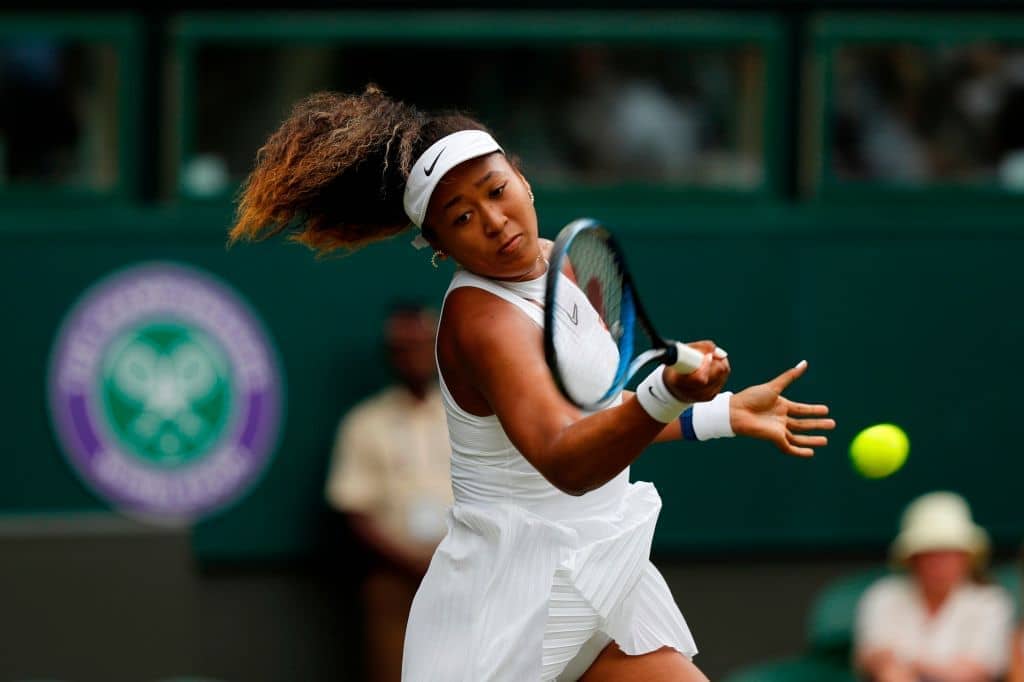What a mess. With just five weeks to go before the start of the tournament, Wimbledon organisers are having to contemplate a potential fiasco. What in previous years was arguably the world’s greatest tennis tournament is at risk of becoming a fractious, politicised and potentially heavily boycotted iteration of itself.
Following a decision by the Association of Tennis Professionals (ATP) and Women’s Tennis Association (WTA) to strip the tournament of ranking points in response to their ban on Russian and Belarusian players, Wimbledon could be reduced to a mere exhibition of arrogance, and short-sightedness. The tournament’s reputation may not recover for years. It is an unforced error of epic proportions.
Things are now going from bad to worse. The latest news is that Japanese star Naomi Osaka has hinted she’ll give Wimbledon a miss, wittily describing it as ‘pointless’. This is a heavy blow as Osaka, though not expected to challenge for the crown, is a huge draw, especially in Asia. The American ace specialist John Isner, a semi-finalist in 2018, is wavering too apparently.
The lack of forethought that seems to have gone into Wimbledon’s decision is striking and alarming
Wimbledon’s organisers, who must be praying a trickle doesn’t turn into a flood, are understood to have sought legal advice over the ATP/WTA points decision. But given that they started it with the highly legally dubious player ban (a point stressed by the players’ groups when they announced the ranking points decision), this smacks of desperation.
How did we get here? When the government pressured, or perhaps even issued veiled threats to, the All England Club back in April, the appetite for sanctions on Russia was at its height. A spirit of international competition as to who could put the furthest distance between themselves and the newly designated pariah states of Russia and Belarus prevailed. There were rumours of panic over the prospect of a humiliated royal personage having to hand over trophies to a Russian or Belarusian, thus handing Vladimir Putin an exploitable propaganda moment. Cynics might also suggest that the government was looking for distractions and some cheap ‘Slava Ukraini’ popularity at a time of particular ‘partygate’ difficulty.
The rationale put forward for the ban always sounded weak. For one thing, even if you accept the principle of punishing national teams, as FIFA has done with Russia’s expulsion from the World Cup, individual tennis players in grand slam tennis tournaments are not representing their countries, only themselves. They don’t enter the arena waving flags. They don’t sing their national anthems before competing. Nationality, save when Britain was desperately in search of a Wimbledon champion, has never been an important feature of grand slam tennis. How many even knew that the now banned former world number one Viktoria Azarenka was from Belarus prior to this controversy?
As for the supposedly potentially humiliating denouement, would Vladimir Putin really have chosen to make a propaganda coup of a Russian victory? And even if he had, so what? It would have looked a grotesque and pathetic gesture against the backdrop of the carnage in Ukraine. It also would have contrasted glaringly with the image of the nation of fair play generously applauding sportsmen and women for their achievements on the court regardless of the actions of their country’s government. More likely Putin would have done nothing, and the moment would have soon passed.
The lack of forethought that seems to have gone into Wimbledon’s decision is striking and alarming. Did they really think this would pass without opposition or have no long-term consequences? Apart from the basic moral question of how unfair it is to attribute war guilt based on nationality alone, the move clearly devalues the tournament as a world class sporting event. Even if every other player does compete, there will always be a case for putting asterisks next to the winners’ names.
And what of the future? Did they expect the Russian and Belarusian players to return with no hard feelings next year, when hopefully the war will be long over? And what if a similar dilemma arises from another world conflict? Is this going to be a regular feature of the organiser’s considerations?
As for the response of the WTA and ATP’S players’ council, since they are dominated by hard-boiled professionals – and you don’t get far in professional sport by being weak-willed – the robust response was surely predictable. As was that of the game’s royalty past and present, who are hardly known for keeping their often strident views to themselves. Billie Jean King and Martina Navratilova both condemned Wimbledon’s decision, with the latter saying it had brought her to the point of tears. Novak Djokovic called it ‘crazy’.
The Wimbledon fiasco has degraded the tournament, set players against themselves and the tournament and seemingly made absolutely no impression on Vladimir Putin, except perhaps to strengthen his resolve. And the ultimate irony is that the suspension of Wimbledon’s ranking points may inadvertently lead to Russia’s Daniil Medvedev becoming world number one. What if Vladimir Putin were to choose to exploit that?
The government had no business pressuring the organisers of a privately run sporting event for political purposes. But once that had happened the organisers could have told sports minister Nigel Huddleston et al to get lost.
I suspect they now wish they had.







Comments